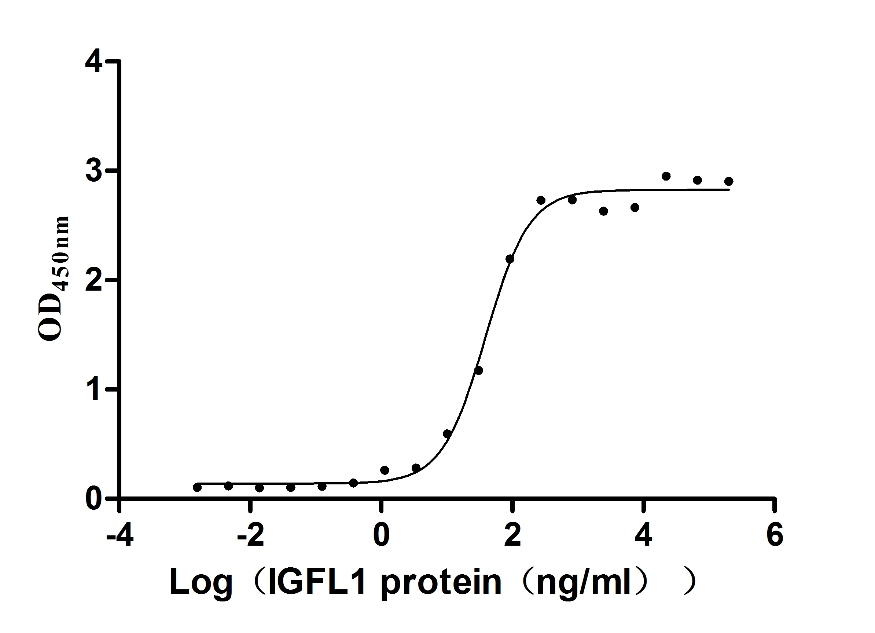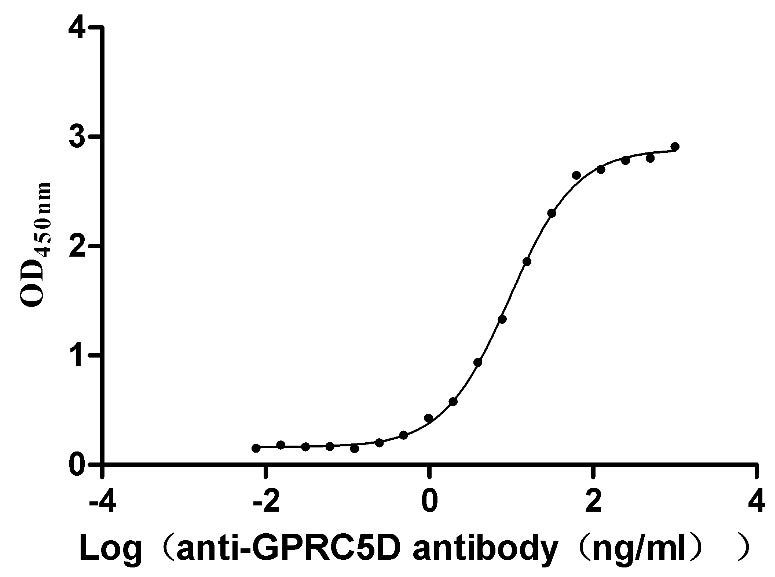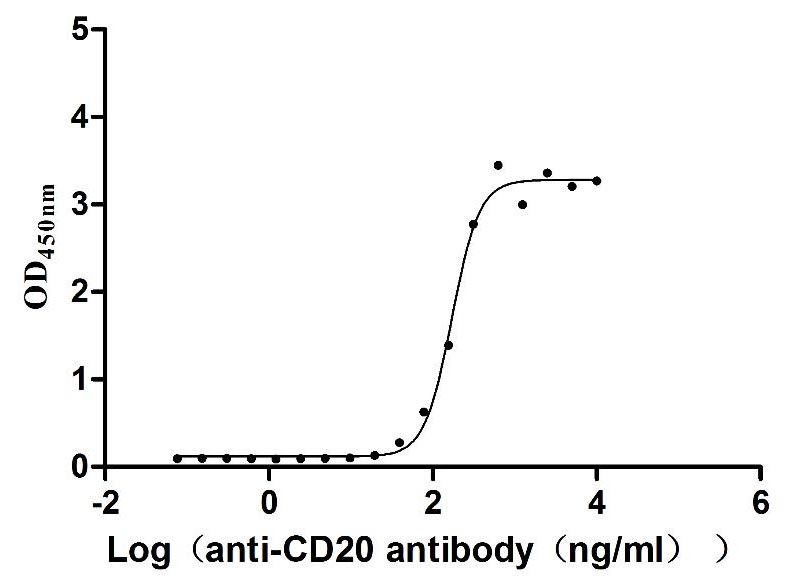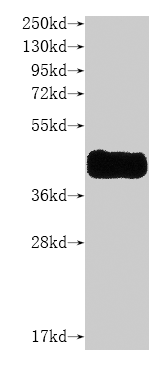Recombinant Human Chromodomain-helicase-DNA-binding protein 7 (CHD7), partial
-
中文名稱:Recombinant Human Chromodomain-helicase-DNA-binding protein 7(CHD7) ,partial
-
貨號:CSB-YP889182HU
-
規(guī)格:
-
來源:Yeast
-
其他:
-
中文名稱:Recombinant Human Chromodomain-helicase-DNA-binding protein 7(CHD7) ,partial
-
貨號:CSB-EP889182HU
-
規(guī)格:
-
來源:E.coli
-
其他:
-
中文名稱:Recombinant Human Chromodomain-helicase-DNA-binding protein 7(CHD7) ,partial
-
貨號:CSB-EP889182HU-B
-
規(guī)格:
-
來源:E.coli
-
共軛:Avi-tag Biotinylated
E. coli biotin ligase (BirA) is highly specific in covalently attaching biotin to the 15 amino acid AviTag peptide. This recombinant protein was biotinylated in vivo by AviTag-BirA technology, which method is BriA catalyzes amide linkage between the biotin and the specific lysine of the AviTag.
-
其他:
-
中文名稱:Recombinant Human Chromodomain-helicase-DNA-binding protein 7(CHD7) ,partial
-
貨號:CSB-BP889182HU
-
規(guī)格:
-
來源:Baculovirus
-
其他:
-
中文名稱:Recombinant Human Chromodomain-helicase-DNA-binding protein 7(CHD7) ,partial
-
貨號:CSB-MP889182HU
-
規(guī)格:
-
來源:Mammalian cell
-
其他:
產(chǎn)品詳情
-
純度:>85% (SDS-PAGE)
-
基因名:CHD7
-
Uniprot No.:
-
別名:ATP-dependent helicase CHD7; ATP-dependent helicase chromodomain helicase DNA binding protein 7; CHD-7; Chd7; CHD7_HUMAN; Chromodomain helicase DNA binding protein 7; chromodomain helicase DNA binding protein 7 isoform CRA_e; Chromodomain-helicase-DNA-binding protein 7; FLJ20357; FLJ20361; HH5; IS3; KAL5; KIAA1416
-
種屬:Homo sapiens (Human)
-
蛋白長度:Partial
-
蛋白標簽:Tag?type?will?be?determined?during?the?manufacturing?process.
The tag type will be determined during production process. If you have specified tag type, please tell us and we will develop the specified tag preferentially. -
產(chǎn)品提供形式:Lyophilized powder
Note: We will preferentially ship the format that we have in stock, however, if you have any special requirement for the format, please remark your requirement when placing the order, we will prepare according to your demand. -
復溶:We recommend that this vial be briefly centrifuged prior to opening to bring the contents to the bottom. Please reconstitute protein in deionized sterile water to a concentration of 0.1-1.0 mg/mL.We recommend to add 5-50% of glycerol (final concentration) and aliquot for long-term storage at -20℃/-80℃. Our default final concentration of glycerol is 50%. Customers could use it as reference.
-
儲存條件:Store at -20°C/-80°C upon receipt, aliquoting is necessary for mutiple use. Avoid repeated freeze-thaw cycles.
-
保質(zhì)期:The shelf life is related to many factors, storage state, buffer ingredients, storage temperature and the stability of the protein itself.
Generally, the shelf life of liquid form is 6 months at -20°C/-80°C. The shelf life of lyophilized form is 12 months at -20°C/-80°C. -
貨期:Delivery time may differ from different purchasing way or location, please kindly consult your local distributors for specific delivery time.Note: All of our proteins are default shipped with normal blue ice packs, if you request to ship with dry ice, please communicate with us in advance and extra fees will be charged.
-
注意事項:Repeated freezing and thawing is not recommended. Store working aliquots at 4°C for up to one week.
-
Datasheet :Please contact us to get it.
靶點詳情
-
功能:Probable transcription regulator. Maybe involved in the in 45S precursor rRNA production.
-
基因功能參考文獻:
- Seventeen heterozygous CHD7 Rare Sequence Variants (RSV), including 2 protein-truncating variants and 15 missense variants, were identified in 18 of the 116 CHH probands. The allele frequency of CHD7 RSVs was significantly higher in CHH probands relative to CoLaus controls (7.8%, 18/232, vs. 0.1%, 1/810; P = 1.6 x 10-11). PMID: 29144511
- These data suggest that CHD7 drives differentiation, and there is a lower limit for CHD7 to initiate differentiation and an upper limit for CHD7 if maintained in undifferentiated state, and such upper limit varies depending on culture condition. PMID: 29321579
- Focus on the endocrine phenotypes associated with CHD7 mutational spectrum in humans (review). PMID: 29152903
- results suggest CHD7, through its interactions with superenhancer elements, acts as a regulatory hub in the orchestration of the spatiotemporal dynamics of transcription factors to regulate neuroepithelial and CNS lineage identities. PMID: 29440260
- These results demonstrate the oncogenic potential of CHD7 and its association with poor prognostic parameters in human cancer. PMID: 28649742
- CHD7 mutation is associated with small Cell Lung Cancer. PMID: 28007623
- CHD7 is an important factor in the proliferation and stemness maintenance of neural stem/progenitor cells. PMID: 27955690
- Data suggest protein levels of kalirin and CHD7 in circulating extracellular vesicles (EVs) as endothelial dysfunction markers to monitor vascular condition in hypertensive patients with albuminuria. PMID: 28152519
- Data suggest that CHD6 and CHD7 both bind with high affinity to short linker DNA, whereas CHD8 requires longer DNA for binding; thus, CHD8 slides nucleosomes into positions with more flanking linker DNA than CHD7; CHD6 disrupts nucleosomes in a distinct non-sliding manner. PMID: 28533432
- Our findings provide evidence that CHARGE and Kabuki syndromes result from dysregulatrion of CHD7 and KMT2D genes involved embryonal development that are expressed in a tissue-specific manner. PMID: 28475860
- De novo missense variant in CHD7 identified in a family presenting with musculoskeletal abnormalities as the main manifestation of CHD7-related disease, representing a new phenotype. PMID: 26813943
- Our zebrafish CHARGE model thus reveals important regulatory roles for Chd7 at multiple points of neural crest development viz., migration, fate choice and differentiation and we suggest that sox10 deregulation is an important driver of the neural crest-derived aspects of Chd7 dependent CHARGE syndrome. PMID: 27418670
- This study established a new epigenetic regulation of mesenchymal stem cell (MSC) osteogenic differentiation and provided a potential target for controlling MSC osteogenesis. PMID: 27586276
- the case of a girl with a novel heterozygous deletion in exon 15 of the CHD7 gene and combined agenesis of uterus and ovaries, besides gonadotropin deficiency, thus expanding the geno-phenotype of CHARGE syndrome. PMID: 26741373
- We report here another sporadic case with mild CHARGE syndrome, with heart defect, sensorineural deafness and hypoplastic semi-circular canals. It should be emphasized that patients should not be rejected for CHD7 analysis if they do not fulfill criteria for atypical or typical CHARGE as there is a high intra- and inter-familial variability PMID: 26921530
- Pathogenic CHD7 variants are associated with CHARGE syndrome. PMID: 26590800
- Two mutations of CHD7 were identified including a novel splice-site mutation (c.2443-2A>G) and a previously known frameshift mutation (c.2504_2508delATCTT). PMID: 26551301
- CHD7 mutations and CHARGE syndrome (Review) PMID: 21378379
- Here, we review recent work aimed at understanding the mechanism of CHD7 function in normal and pathological states, highlighting results from biochemical and in vivo studies. PMID: 26411921
- Like KMT2D, CHD7 interacts with members of the WAR complex, namely WDR5, ASH2L and RbBP5. We therefore propose that CHD7 and KMT2D function in the same chromatin modification machinery. PMID: 24705355
- CHARGE syndrome due to deletion of region upstream of CHD7 gene START codon. PMID: 26334530
- These data provide additional evidence that CHD7 mutations are a significant cause of semicircular canal atresia in children with full or partial CHARGE syndrome. PMID: 24979395
- CHD7 mutations are not a major cause of atrioventricular septal and conotruncal heart defects. PMID: 25257999
- Functionally compromised CHD7 missense alleles contribute to the pathogenesis of both the anosmic and normosmic forms of Isolated gonadotropin-releasing hormone deficiency. PMID: 25472840
- Two new intronic CHD7 mutations are associated with CHARGE syndrome phenotype. PMID: 23495722
- Mutations were found in the following genes in one or more patients with congenital hypogonadotropic hypogonadism: KAL1, FGFR1, GNRHR, and CHD7 PMID: 24732674
- The objective of the study was to determine the nature, prevalence, mode of transmission, and clinical spectrum of CHD7 mutations in a large series of patients. PMID: 25077900
- CHD7 was dysregulated, ranking above the 90th percentile in differential expression in a panel of PDAC clinical specimens, highlighting its potential as a biomarker. PMID: 24626090
- Taken together this represents the first evidence for a CHD7 intragenic complex genomic rearrangement in a patient with CHARGE syndrome leading to what appears to be also the first report of a mutation specifically disrupting exon-7. PMID: 23956205
- Data indicate no significant results were found for linkage analysis or tests of association between genetic variants of the CHD7 and familial idiopathic scoliosis (FIS). PMID: 23883829
- Genes that regulate chromatin were mutated in CpG island methylator phenotype 1 colorectal carcinoma; the highest rates of mutation were observed in CHD7 and CHD8. PMID: 24211491
- CHD7 plays an important role in cardiac development. PMID: 23677905
- genetic association studies in population in Massachusetts: Data suggest that clinical features in Kallmann syndrome (KS) are highly associated with genetic causes: hearing loss is associated with genetic variations/mutations in CHD7. PMID: 23533228
- There is a strong association between the CHARGE phenotype and a mutation of the CHD 7 gene on the long arm of chromosome 8. Diagnosis now can be confirmed but not excluded with a positive mutation of this gene. PMID: 23187639
- Study identified one nonsense and two novel missense mutations in the CHD7 gene in three Korean patients with clinical features of CHARGE syndrome, one of whom had also been diagnosed with Patau syndrome. PMID: 23333604
- Nucleosome remodeling is a key function for CHD7 during developmental processes. PMID: 23134727
- The data shows that patients with congenital hypogonadotropic hypogonadism and a truncating CHD7 mutation can undergo reversal. PMID: 22724017
- In patients with CHARGE syndrome,the mutations are equally distributed along the coding region of CHD7 and most are nonsense or frameshift mutations. Most mutations are unique, but 94 recurrent mutations were identified. PMID: 22461308
- Data show that pathogenic missense mutations are mainly present in the middle of the CHD7 gene, whereas benign variants are mainly clustered in the 5' and 3' regions. PMID: 22539353
- The results indicate that CHD7S functions cooperatively or antagonistically with CHD7L in the nucleolus and nucleoplasm, respectively. PMID: 22646239
- De novo CHD7 mutations associated with CHARGE syndrome occur predominantly in the male germ line. PMID: 21554267
- We identified three heterozygous CHD7 mutations in patients with Kallmann syndrome. The CHD7-positive patients were carefully reexamined and were all found to have additional features of CHARGE syndrome. PMID: 22399515
- analysis of CHD7 mutations and clinical considerations for auditory rehabilitation in deaf patients with CHARGE syndrome PMID: 21931733
- that bilateral large retinochoroidal colobomata represents a typical ophthalmic feature of CHARGE syndrome in patients with confirmed CHD7 mutations PMID: 22302456
- in CHD7 3 novel de novo heterozygous mutations were identified:mutation in the donor splice site of intron 24, missense mutation in exon 2 and deletion in exon 11. PMID: 20943277
- Five novel mutations - one missense (c.2936T > C), one nonsense (c.8093C > A) and three frameshift mutations (c.804_805insAT, c.1757_1770del14, c.1793delA in patients with CHARGE syndrome PMID: 20624498
- CHD7 mutations have also been found in some patients with Kallmann syndrome, hypogonadotrophic hypogonadism, and anosmia, and we discuss the overlap between this syndrome and CHARGE syndrome. PMID: 21041284
- This well-defined syndrome is caused by mutations in the chromodomain helicase DNA-binding (CHD7) gene, present in about 60% of CHARGE patients<< PMID: 20425471
- CHD7 functions in the nucleolus as a positive regulator of ribosomal RNA biogenesis. PMID: 20591827
- [review] tissue-specific effects of CHD7 deficiency, known CHD7 interacting proteins, and downstream target sites for CHD7 binding; CHD7 as a critical regulator of important developmental processes in organs affected by human CHARGE syndrome PMID: 20507341
顯示更多
收起更多
-
相關(guān)疾病:CHARGE syndrome (CHARGES); Idiopathic scoliosis 3 (IS3); Hypogonadotropic hypogonadism 5 with or without anosmia (HH5)
-
亞細胞定位:[Isoform 1]: Nucleus.; [Isoform 3]: Nucleus, nucleolus.
-
蛋白家族:SNF2/RAD54 helicase family
-
組織特異性:Widely expressed in fetal and adult tissues.
-
數(shù)據(jù)庫鏈接:
Most popular with customers
-
Recombinant Human Tumor necrosis factor receptor superfamily member 14 (TNFRSF14), partial (Active)
Express system: Mammalian cell
Species: Homo sapiens (Human)
-
Recombinant Human Secreted and transmembrane protein 1 (SECTM1), partial (Active)
Express system: Mammalian cell
Species: Homo sapiens (Human)
-
Recombinant Human Glypican-3 (GPC3) (G537R), partial (Active)
Express system: Mammalian cell
Species: Homo sapiens (Human)
-
Recombinant Human Insulin growth factor-like family member 1 (IGFL1) (Active)
Express system: Mammalian cell
Species: Homo sapiens (Human)
-
Recombinant Human G-protein coupled receptor family C group 5 member D (GPRC5D)-VLPs (Active)
Express system: Mammalian cell
Species: Homo sapiens (Human)
-
Recombinant Dog B-lymphocyte antigen CD20 (MS4A1)-VLPs (Active)
Express system: Mammalian cell
Species: Canis lupus familiaris (Dog) (Canis familiaris)
-
Recombinant Human C-C chemokine receptor type 8 (CCR8)-VLPs (Active)
Express system: Mammalian cell
Species: Homo sapiens (Human)
-
Recombinant Human C-type lectin domain family 4 member C (CLEC4C), partial (Active)
Express system: Mammalian cell
Species: Homo sapiens (Human)



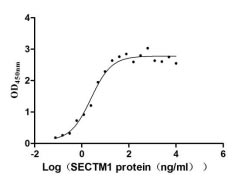
-AC1.jpg)
